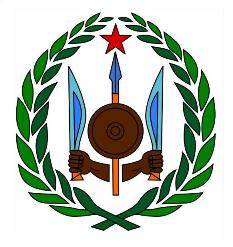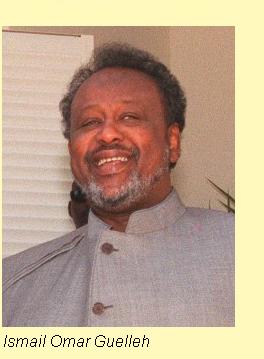

REPUBLIC OF DJIBOUTI
• Official name: Jumhuriya Jibuti / Republique de Djibouti (Republic of Djibouti)
• Location: East Africa
• International organisations: African, Caribbean and Pacific Group of States, African Union, Non-Aligned
Movement, Organisation Internationale de la Francophonie, Organisation of Islamic Conference, United Nations,
World Trade Organisation
• Borders: Eritrea, Ethiopia, Somalia
• Coastline: Red Sea
• Land area: 23,000 Km2
• Population: 860,000
• Annual GDP (PPP) per capita: US$2,800 (2009 CIA estimate). World ranking: 136
• Ethnicity: More than 60% of the population are Somalis, while about 35% are Afars. There are
small Arab and European minorities
• Languages: Arabic and French are the official languages, but most of the population speaks
Afar or Somali.
• Religion: Over 95% of the population are Sunni Moslems. There is a small Christian minority.
• Form of government: Presidential republic. The country is divided into five districts.
• Capital: Djibouti
• Constitution: The
Constitution of Djibouti came into effect on 4 September 1992.
• Head of state: The President, elected by direct universal suffrage for a six-year term.
• Head of government: The Prime Minister, appointed by the President. In theory the Prime Minister
is the leader of the largest party in the legislature and is accountable to it. In practice he is
accountable to the President. Dileita Mohamed Dileita has
been Prime Minister since March 2001.
• Legislature: Djibouti has a unicameral legislature. The
National Assembly (al-Majlis al-Watani, Assemblee Nationale)
has 65 members, elected for five-year terms from five multi-member constituencies.
• Electoral authority: None
• Freedom House 2009 rating: Political Rights 5, Civil Liberties 5

Political history
The town of Djibouti was under Abyssinian control until it was seized by the French in 1862. The area
became the colony of French Somaliland in 1896. It became a French overseas territory in 1946, and in
1956 it was granted internal self-government. Independence was delayed, however, by ethnic conflict
between Somalis and Afars and the possibility of a territorial claim by Somalia. In 1967 a referendum
rejected immediate independence, and the territory was renamed the Territory of the Afars and Issas.
Renewed nationalist agitation led to independence as the Republic of Djibouti in June 1977.
Hassan Gouled Aptidon of the Popular Rally for Progress (RPP) became President and declared a one-party state
in 1981. In 1999 Aptidon resigned and a multi-party constitution adopted. But the RPP remains the dominant party.
The RPP's Ismail Omar Guelleh
(Aptidon's nephew) was elected President in 1999. He was re-elected unopposed in 2005 after opposition parties boycotted the
election. At the 2003 legislative election, the RPP won all the seats. The opposition boycotted the 2008
legislative elections, so the RPP has a monopoly in the National Assembly.
Freedom House's 2009
report on Djibouti
says: "Djibouti is not an electoral democracy. The formal existence of representative government and electoral
processes have little relevance to the real distribution and exercise of power. The ruling party has traditionally
used the advantage of state resources to maintain itself in government... Opposition parties are significantly
disadvantaged by electoral rules and the government's abuse of the administrative apparatus... Efforts to curb the
country's rampant corruption have met with little success... Djibouti was ranked 102 out of 180 countries surveyed in
Transparency International's 2008 Corruption Perceptions Index... Despite constitutionally mandated protections,
freedom of speech is not upheld in practice... Freedoms of assembly and association are nominally protected under the
constitution, but the government has demonstrated little tolerance for political protests... The courts are not
independent of the government."
Updated February 2010
|

